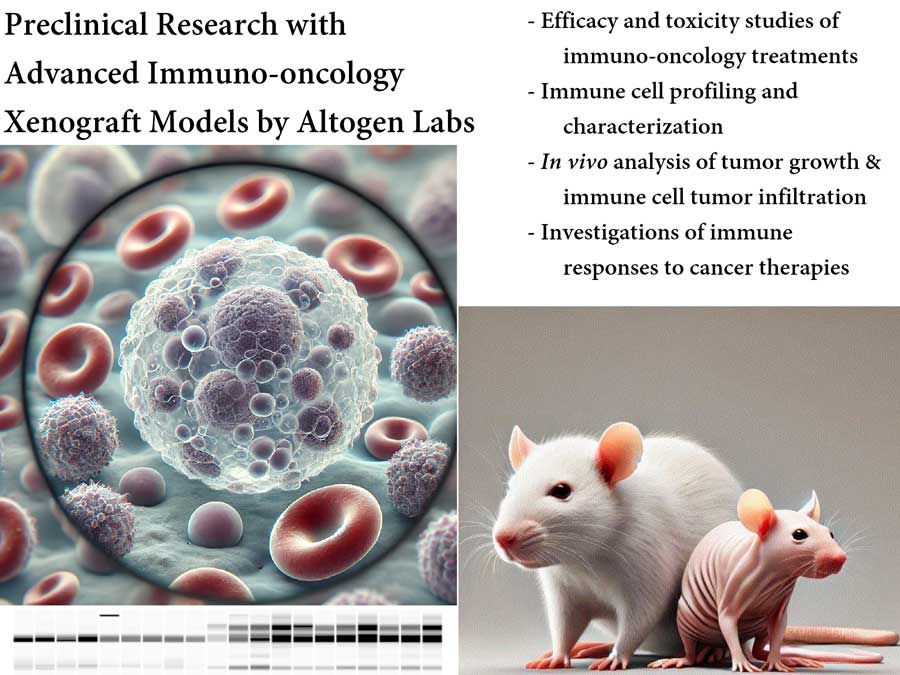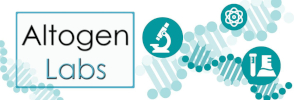Altogen Labs immuno-oncology provides contract research studies employing CD34+ humanized mice, which have become invaluable in the study of cancer immunotherapies. Immunodeficient mice engrafted with CD34+ hematopoietic stem/progenitor cells (HSPCs) represent a well-validated and robust humanized mouse model for immuno-oncology efficacy studies. These models facilitate bone marrow engraftment, leading to the development of multi-lineage human immune cells in peripheral blood. This system is particularly beneficial in studies involving induced pluripotent stem cells (iPSCs), peripheral blood mononuclear cells (PBMCs), or engineered cells such as CAR-T cells or genetically modified HSPCs.
Altogen Labs offers both custom and standardized donor humanized mouse models for preclinical immuno-oncology research. Our expert team provides comprehensive immuno-oncology services using humanized immune system (HIoS) mouse models with CD34+ cells. These models are specifically designed to replicate the human immune system, allowing us to assess the efficacy and safety of immuno-oncology test articles in a preclinical setting.
Preclinical cancer research relies on various in vivo models to replicate human tumor biology and immune responses. The most commonly used models include xenograft mouse models, genetically engineered mouse models (GEMMs), patient-derived xenografts (PDXs), and humanized immuno-oncology system (HIoS) mice. Among these, HIoS models have gained prominence due to their ability to closely mimic human immune responses, making them essential tools for studying the complex interplay between human immune components and tumors of human origin.
Human Peripheral Blood Lymphocyte Mouse Models (PBL Models):
Created by injecting human PBMCs into adult immunodeficient mice. These models are ideal for investigating T cell-mediated immune responses, as they predominantly develop functional human T cells. However, their major limitation is the rapid onset of graft-versus-host disease (GvHD), which restricts their use to short-term studies.
Hu-CD34+ Humanized Mice:
Generated by injecting CD34+ HSCs into neonatal or young adult immunodeficient mice, these models are widely used in immuno-oncology research. They enable long-term studies of immune responses and therapeutic interventions, including the evaluation of immune checkpoint inhibitors. Hu-CD34+ mice develop functional human lymphoid and myeloid compartments, which are essential for studying immune responses to cancer therapies. To enhance engraftment, host mice typically undergo sublethal irradiation, followed by the transplantation of CD34+ HSCs.
Bone Marrow-Liver-Thymus (BLT) Humanized Mice:
This model is created by transplanting human fetal liver and thymus fragments along with CD34+ HSCs into immunodeficient mice. It enables the development of human lymphoid and myeloid lineages and is particularly useful for long-term studies and investigations into complex immune-tumor interactions.
Factors Influencing HIoS Model Efficacy:
The efficacy of HIoS models is highly dependent on the level of immunodeficiency in the host mice. Mice strains with higher degrees of immunodeficiency, such as NOD/SCID or NSG mice, allow for better engraftment and reconstitution of the human immune system. These models are also responsive to tumor antigens, vaccines, and immunotherapies, making them indispensable for evaluating a wide range of experimental cancer treatments.

In addition to their basic use in engraftment studies, HIoS models can be tailored to enhance specific immune cell compartments. This allows researchers to study targeted therapies, such as chimeric antigen receptor T (CAR-T) cell therapies, bispecific antibodies, and cancer vaccines. Their ability to support long-term immune-tumor interaction studies also extends their utility beyond cancer research to fields such as infectious disease and inflammatory disease modeling.
By providing a versatile and reliable platform for investigating human immune responses, HIoS models have become pivotal tools in the development of novel cancer immunotherapies. Their ability to mimic human immune function, combined with their adaptability to a variety of experimental designs, underscores their growing importance in preclinical immuno-oncology research.
This comprehensive platform allows Altogen Labs to offer tailored solutions that help advance the development of new immunotherapies, ensuring more accurate predictions of clinical outcomes in human patients.
